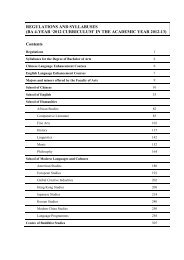Bachelor of Arts (BA) - The University of Hong Kong
Bachelor of Arts (BA) - The University of Hong Kong
Bachelor of Arts (BA) - The University of Hong Kong
Create successful ePaper yourself
Turn your PDF publications into a flip-book with our unique Google optimized e-Paper software.
276MUSI2019. II/III.15 Music in society (3 credits)(This course is also <strong>of</strong>fered to second and third year non-<strong>BA</strong> students for inter-Faculty broadeningpurposes.)This course is open only to non-majors, and is designed for students with little or no background whoare interested in music as a social activity. Discussion <strong>of</strong> music in tribal cultures, popular music and itscultural meanings, political musics, and social patterns <strong>of</strong> performance, consumption andcommunication are explored.Assessment will be on the basis <strong>of</strong> coursework (50%) and an examination (50%).PHILOSOPHYStudying philosophy is a training in thinking - critically, creatively and independently. It is one <strong>of</strong> thebest preparations for pr<strong>of</strong>essional work. Our graduates hold important positions in public life, in thecommercial field, in education, and in many other areas.Our syllabus enables you to take a small amount <strong>of</strong> philosophy (in any year <strong>of</strong> study withoutprerequisites), to major in philosophy (or in the Linguistics and Philosophy, or the Politics andPhilosophy programmes), or to take a double-major, combining philosophy equally with another <strong>Arts</strong> orSocial Sciences discipline.Courses are <strong>of</strong>fered in the form <strong>of</strong> lectures, seminars and tutorials. Particular importance is attached totutorial work.What should be distinctive and important in a university education is developing the ability in studentsto take responsibility for their own work: our syllabus and our approach to teaching is guided by thisprinciple.Our department is also known, world-wide, for the pioneering role it has had over the last two decadesin exploiting some advantages <strong>of</strong> information technology as a new instrument in learning. Of course,I.T. is not a substitute for thought or more traditional forms <strong>of</strong> learning. But, properly used, it facilitatesour work, as well as helping to develop skills which can be useful more generally.Our courses are divided into three levels and four groups. <strong>The</strong> three levels correspond to the three years<strong>of</strong> study for an undergraduate degree. But it is open to students in any Faculty to take, for instance, afirst level philosophy course in any year <strong>of</strong> study (provided that the regulations <strong>of</strong> their own degreeprogramme permit it). <strong>The</strong> four groups are <strong>of</strong> courses related by subject-matter. <strong>The</strong> four first-levelcourses correspond roughly to these groups.FIRST LEVEL<strong>The</strong> Department <strong>of</strong>fers four general introductory courses in philosophy and two introductory courses inlogic. <strong>The</strong>re are no prerequisites. All these courses will normally be <strong>of</strong>fered every year.PHIL1001.Knowledge <strong>of</strong> the world: an introduction to philosophy (6 credits)(This course is also <strong>of</strong>fered to first year non-<strong>BA</strong> students for inter-Faculty broadening purposes.)Human beings have always attempted to understand and control the world they live in by askingquestions, and seeking effective answers, about that world. <strong>The</strong>se attempts have taken many forms, butphilosophy has always been a central part <strong>of</strong> this process <strong>of</strong> explanation and the progress <strong>of</strong> knowledge.<strong>The</strong> questions <strong>of</strong> what we can know, how we can know, and how we can use what we know, are primeexamples <strong>of</strong> philosophical questions that have come down to us in a long history <strong>of</strong> inquiry –philosophy is a part <strong>of</strong> the natural and practical curiosity <strong>of</strong> mankind.Assessment: 100% coursework (may include in-class test).
















